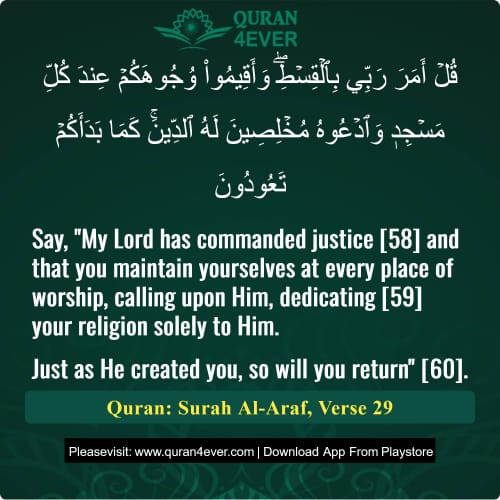
Transliteration:( Qul amara Rabbee bilqisti wa aqeemoo wujoohakum 'inda kulli masjidin wad'oohu mukhliseena lahud deen; kamaa bada akum ta'oodoon )
"Say, 'My Lord has commanded justice [58] and that you maintain yourselves at every place of worship, calling upon Him, dedicating [59] your religion solely to Him. Just as He created you, so will you return' [60]."
The term justice here refers to the state of moderation, which lies between excess and deficiency. It covers all areas of life—beliefs, personal deeds, and national affairs. That is why the command for worship follows it. The word “Mosque” (Masjid) is a noun derived from Sajdah, which implies Salaah (prayer). The command “pray to Him” refers to worshipping Allah Almighty. From this, we learn that facing the Kaaba in prayer is obligatory. If the term Mosque is taken literally, then this verse highlights that Mosques are the best places for congregational prayers. Congregation is obligatory for Fard prayers, and offering them in the Mosque may sometimes be obligatory and at other times recommended (Tafseer Roohul Bayaan).
The phrase “call upon Him” does not mean prayer alone, but rather complete worship. Thus, the command is to worship Allah Almighty alone, with sincerity and full devotion, without associating any partners.
Just as you were once non-existent, and then Allah brought you into existence, similarly, you will die and be brought back again. The purpose of this statement is to remind that since your return is to your Lord, you must remain consistent in His worship. It could also mean that just as you were born naked and uncircumcised, you will be raised the same way on the Day of Judgement.
The tafsir of Surah Al-A’raf verse 29 by Ibn Kathir is unavailable here.
Please refer to Surah A’raf ayat 28 which provides the complete commentary from verse 28 through 30.
(7:29) Say to them (O Muhammad): ‘My Lord enjoins justice; and that you set your faces aright at the time of every Prayer; and that you call upon Him, exclusively dedicating your faith to Him. You shall return to Him as you were created.’[19]
19. The verse seeks to suggest that God has nothing to do with their foolish rituals. So far as the religion truly prescribed by Him is concerned, its fundamental principles are the following:
( 1 ) That man should base his life on justice and righteousness.
(2) That man’s worship should have the right orientation, i.e. that it should he directed to God alone and should be free of every trace of devotion to others than God, that man should reserve his absolute enthralment and bondage for the One True God alone. All these should have only one direction – the One that is truly worthy of worship.
(3) Man should invoke God alone to keep him rightly directed, to grant him help and succour, to favour him with protection and security. This should be done provided one’s life is oriented to serving God. Invoking help from God would be ludicrous if man’s life is based on unbelief, polytheism, disobedience to God, or serving a variety of gods other than the One True God. Such a prayer would amount to asking God’s help in strengthening one in one’s rebellion against Him.
(4) That man should have full conviction that in the same way as God caused him to he born in the world, He will also restore him to life after death and will make him stand before Himself so as to render an account of his life.

For a faster and smoother experience,
install our mobile app now.
Related Ayat(Verses)/Topics